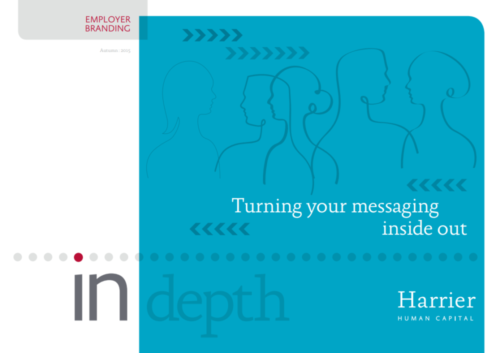What is an employer brand?
Firstly, what is a brand??
Whether you actively manage it or not, your company has a brand. It is not a product, a visual identity, or a logo; your brand is a perception about your business that exists in the minds of your customers, employees, and other stakeholders.
How people feel about your brand can change over time. These feelings are shaped by experiences with your people, products, services, and, increasingly, the way in which your company contributes to society. In fact, research suggests that consumers are actively seeking out brands that can prove their commitment to social responsibility.
Managed well, brands can develop enduring relationships that build feelings of trust and confidence, motivate action, boost self-worth or instill a sense of pride. On the flip side, brands can also evoke strong negative emotions when a promise is not met or a company acts in a way viewed poorly by its customers or the wider community.
Today, we recognise that businesses have several interconnected brands, each with different strategic importance to the firm. For example, your corporate brand may be intimately linked to your CEO’s personal brand (think Virgin and Richard Branson) or secondary to your consumer brands, for example as Proctor and Gamble is to Gillette.
In recent years, how we assign value to firms has shifted and intangible assets such as intellectual property, brand equity, and goodwill can now command as much as 70% - 80% of a firm’s market value. To support this, the employment concept has matured to recognise the psychological contract of mutually beneficial exchange - we are more focused on knowledge development and application and how that can be recognised and rewarded. In this evolution to human-centered organisational value and reciprocity, another important facet of brand has grown in importance: the employer brand.
What is an Employer Brand?
The term employer brand first appeared in management literature in 1996, defined as a package of functional, economic, and psychological benefits provided by employment and identified by the employing company (Ambler & Barrow, 1996). Since then, employer brand has become globally recognised as a powerful long-term strategy that fuses human resources management and marketing practice to attract, engage, retain, and motivate employees.
In the same way that we brand products by communicating a unique value proposition to customers and offering them a collection of desirable attributes and benefits, the employer brand communicates the employee value proposition: a differentiated employment offering that positions a business as a great place to work.
While firmly grounded in human resources, by drawing on the principles of marketing research, product branding, and relationship marketing, employer branding successfully brings together culture, people experience and corporate social responsibility to build positive and enduring relationships with current and prospective employees.
“Don’t kid yourself that employer branding is the same as brand management. It isn’t. You can’t spin your way to an employer brand. ”
An employer brand is not something that you can create with a glossy magazine campaign or carefully crafted job advert. The art of employer branding is the delivery of human experiences that communicate your unique offering in an authentic way. A strong employer brand delivers value to employees far beyond functional or material benefits, such as on-the job training, salary, bonuses or the much-touted ping-pong table; it creates feelings of belonging, a sense of pride and purpose, and continually reinforces to people that they are exactly where they are meant to be.
In an increasingly competitive job market, a strong employer brand will help attract talented people to your business and encourage them to stay. It can also improve your consumer and corporate brands by better aligning your human resources to your company values, mission and vision – helping to deliver on-brand customer experiences and achieve broader business objectives. In this way, employer brand delivers a measurable return on investment by contributing to the productivity, growth and success of the organisation.
If you would like support with EVP or employer brand strategy, then please get in touch.
Harrier is pleased to offer a complimentary consultation to discuss your key challenges and objectives, and help you articulate a road-map for success.
An effective employer brand strategy can help build feelings of connectivity, loyalty, and safety. If managed poorly, efforts may be at risk of seeming token, insincere or lacking authenticity. So what can you focus on to help steer your business through a pandemic-bruised world?
The most effective EVP and employer brand strategies involve a continual cycle of measurement and feedback. Here we take a look at some useful metrics for evaluating progress and success.
A successful employer brand strategy starts with a strong employee value proposition (EVP). We discuss how to understand your EVP from the perspective of your employees and develop an EVP that will gives people a clear and compelling reason to join, and stay with, your company.
In an increasingly competitive job market, a strong employer brand will help attract talented people to your business and encourage them to stay. So what is an employer brand and how do you create it?
This whitepaper provides tangible initiatives for talent professionals to consider when articulating their EVP.
This paper explores the elements of successful talent attraction. It will help you to identify your critical roles, understand your employee value proposition (EVP) and shape your employer brand. We also provide guidance on defining recruitment team roles and implementing complementary technology to ensure your talent and employer branding strategies are successful.
GET STARTED






